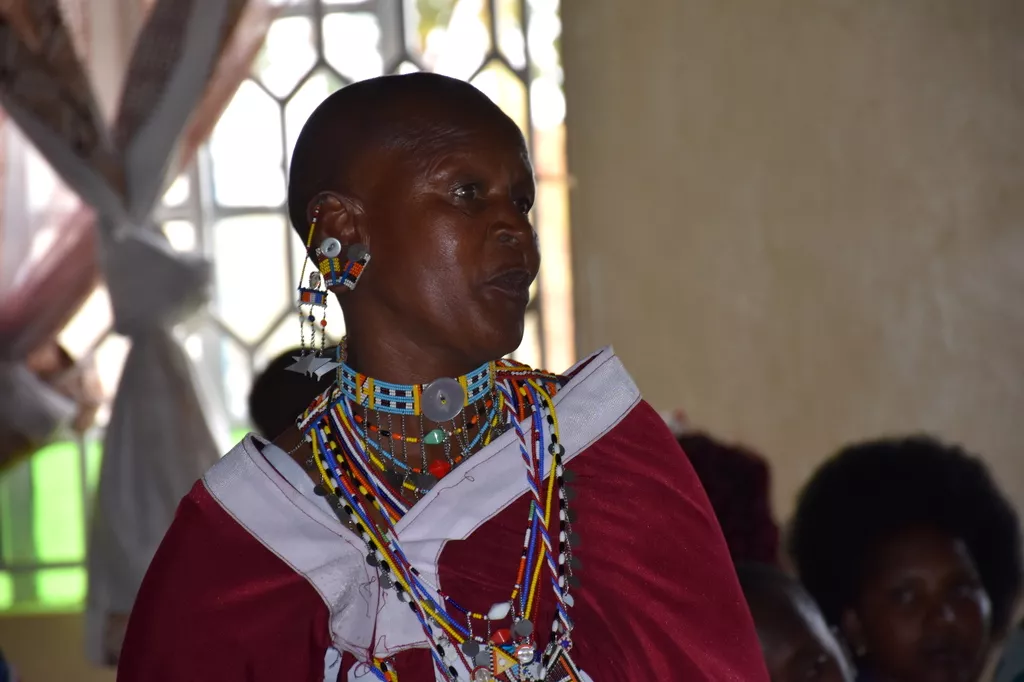Rising above cultural barriers

When Mary Nkisongoi rose to speak during the 2019 International Literacy Day commemoration in Narok Kenya, a cloud of silence befell the audience which included government representatives and community members. Mary’s stage presence, confidence and her articulation of issues were outstanding.
When the Director of Education, Rift Valley region took to the stage to make his address, Mary’s poise and articulation was the first thing he pointed out. As if to provoke Mary’s newly acquired spirit, the director asked her albeit jokingly, what she would like to be when she ‘grows’ up. “A doctor,” she replied, “Specifically, a mid-wife!” insisted Mary, a 61 - year-old mother of 12, amidst applause and laughter from the over 400 participants.
Now Mary story is remarkable as she has done a complete turnaround in less than two years. Mary comes from the Maasai community. In this patriarchal community, women are traditionally considered second fiddle to men, which is reflected in all aspects of daily life from speaking, talking and even walking. For instance, a woman must walk behind a man regardless, even if they are a couple. A woman can also only speak after a man has spoken, and this can only be after a man has authorised her to speak.
These patriarchal structures compounded with low literacy levels among women further exacerbates the situation. It is from this background that Mary emerges and just barely two years ago, Mary did not have the courage or the confidence to even speak at a meeting that included men.
Forum Syd, in partnership with the International Labour Organization (ILO), is co-implementing the Inclusive Growth Through Decent Work Project in Nakuru and Narok Counties. This project seeks to reduce poverty and improve living conditions through decent work and access to rights-based services among the rural population in the Great Rift Valley. Through the Right(s) Way Forward (RWF) methodology, an avenue has been provided for the communities to engage in dialogue with the duty bearers, as well as be fully involved in issues that are of importance to them.
The project has incorporated women as part of community trainers and facilitators, an action that would have been unimaginable in the recent past. This inclusion has demonstrated that men and women can work together and engage, without one gender seeming to disempower the other. Jointly, this community has undertaken joint mapping and analysis of their needs and developed Community Action Plans that provide a roadmap towards localised desired sustainable changes, with the community at the driving seat of such a change
Resultantly, women are now increasingly coming out and claim their space in community decision-making processes. Mary is part of an upcoming group of women in Suswa that are championing the paradigm shift, encapsulated by a visible sense of self-confidence and the urge to engage in solutions towards improving their community. These women are now frequently involved in crucial community processes in terms of community needs identification, prioritisation, actions and follow-ups. On several activities, the women have engaged men on reflections on traditional gender norms which is unconventional in this kind of patriarchal societal setting.
“In public barazas (forums), women are now confident to make contributions on issues that affect the community and topics like Female Genital Mutilation, previously perceived as taboos,” says Dansen Reson, the Assistant Chief - Suswa. The chief also noted that due to awareness and the new sense of confidence, there has been increased reporting of cases of gender-based violence as more women and girls are increasingly coming out.
I think men have realised that a strong society needs strong women, and with that realisation, they are slowly abandoning not only the structural chauvinism but also gender stereotypes
The change is not, however, limited to women alone. Men are slowly starting to support women’s engagement in community decision making processes but also seeing shifting gender roles. ‘Steve’ a husband to one of the project’s community facilitators acknowledges that he was a bit sceptical at first about having his wife spend time away from the family to attend to community and the project activities, but his scepticism has changed over time.
“Nowadays, we plan and agree on what time she will be away and how I can support. For instance, when she is away in her engagements, I take care of the kids,” says ‘Steve’.
“I think men have realised that a strong society needs strong women, and with that realisation, they are slowly abandoning not only the structural chauvinism but also gender stereotypes,” says Kuria Mbugua, Forum Syd’s project officer.
“I hope this change is irreversible and, in a few generations, equality becomes the new normal, and women end taking up leadership positions alongside men at community and local level governance,” concludes Titus.
Other recent articles

The power of people powered Public-Private Partnerships
Public–Private Partnerships (PPPs) are often discussed in terms of roads, power plants, housing, and other large infrastructure projects. But as discussed on the People’s Partnership Podcast, PPPs are...

ForumCiv’s social media accounts labelled as “extremist materials” in Belarus
Important message to our Belarusian followers. Any interaction with our content can now lead to legal consequences in Belarus. Please read the information below and take the necessary precautions for...

ForumCiv enters new strategic partnership
ForumCiv is proud to announce a new three-year strategic partnership with Sida, totalling SEK 137 million.